Foods That Reduce Anxiety (and Those That Make It Worse)
Introduction
Anxiety doesn’t just live in the mind — it’s also influenced by the body. What you eat can either fuel your nervous system with calming nutrients or rev up the very mechanisms that trigger stress, panic, and worry. If you’ve ever felt jittery after too much coffee or soothed after a bowl of oatmeal, you’ve already experienced the food-mood connection firsthand.
In this deep dive, we’ll explore:
🌱 The best foods that calm anxiety
🚫 The worst foods that worsen it
🧠 The science behind nutrients and the brain
🍵 Supplements, lifestyle practices, and meal strategies for lasting calm
By the end, you’ll have a practical nutrition roadmap for easing anxiety naturally.
Looking for supplements for people with Social Anxiety? Click here.
🧠 The Food–Anxiety Connection
Your brain and gut are deeply connected through the gut-brain axis — a two-way communication network powered by the vagus nerve, neurotransmitters, and gut bacteria. This means the foods you eat influence your mental health in several ways:
Neurotransmitter production: Foods provide amino acids and cofactors needed to make serotonin, dopamine, and GABA (calming brain chemicals).
Inflammation regulation: Anti-inflammatory foods help protect brain cells, while processed foods can trigger oxidative stress.
Blood sugar stability: Balanced meals prevent cortisol and adrenaline spikes that mimic anxiety.
Gut microbiome health: Beneficial bacteria create metabolites like short-chain fatty acids that support calmness.
In short, what’s on your plate can either fuel peace of mind or fan the flames of worry.
🌿 Foods That Reduce Anxiety

🥦 Leafy Greens (Spinach, Kale, Swiss Chard)
Leafy greens are rich in magnesium, a mineral often called “nature’s chill pill.” Magnesium helps regulate GABA, the neurotransmitter that quiets overactive neurons. Studies show magnesium deficiency is linked to higher anxiety and stress reactivity.
Pro tip: Pair greens with a squeeze of lemon for better iron absorption.
🥑 Healthy Fats (Avocados, Olive Oil, Nuts)
Avocados, nuts, and olive oil are full of monounsaturated fats and B vitamins, crucial for nervous system function. They also stabilize blood sugar, preventing anxiety-inducing dips.
Why it helps: Stable blood sugar = stable mood.
🐟 Fatty Fish (Salmon, Sardines, Mackerel)
Omega-3 fatty acids (EPA and DHA) reduce inflammation in the brain and improve neurotransmitter signaling. Research links regular omega-3 intake to lower social anxiety and depression symptoms.
Eat at least 2 servings/week. For plant-based eaters, chia seeds and flaxseeds are good (though less bioavailable) alternatives.
🍊 Citrus Fruits and Berries
Vitamin C reduces cortisol, the stress hormone. Berries also contain antioxidants that protect brain cells from oxidative stress.
Snack idea: Greek yogurt with blueberries = probiotics + antioxidants.
🌾 Whole Grains (Oats, Quinoa, Brown Rice)
Whole grains are rich in complex carbs, which increase serotonin availability in the brain. They also stabilize blood sugar, preventing the crash-anxiety cycle.
Best picks: Steel-cut oats, buckwheat, quinoa.
🧄 Fermented Foods (Kimchi, Sauerkraut, Yogurt)
The gut microbiome plays a central role in mental health. Fermented foods provide probiotics, which may help reduce social anxiety by improving gut-brain communication.
🌰 Seeds (Pumpkin, Sunflower, Hemp)
Seeds are packed with zinc and tryptophan, both important for serotonin synthesis. Low zinc levels are correlated with higher anxiety.
🍵 Herbal Teas (Chamomile, Green Tea)
Chamomile contains apigenin, a compound that binds to GABA receptors, producing a mild sedative effect. Green tea contains L-theanine, which promotes calm alertness without drowsiness.
🍫 Dark Chocolate
Dark chocolate (70%+) contains flavonoids that improve blood flow to the brain and reduce stress. It also provides magnesium and tryptophan.
But: moderation is key — too much sugar can cancel out benefits.
🚫 Foods That Make Anxiety Worse
Just as some foods soothe, others silently fuel anxiety.
☕ Caffeine
Caffeine increases cortisol and adrenaline, mimicking anxiety symptoms like racing heart and restlessness. People with social anxiety are especially sensitive.
Tip: Swap coffee for matcha or herbal tea.
🥤 Refined Sugar
Sugar spikes blood glucose, leading to a crash that triggers shakiness, irritability, and anxious thoughts. It also increases inflammation.
Watch out for hidden sugars in sauces, cereals, and drinks.
🍔 Processed Foods & Trans Fats

Fast foods, fried foods, and processed snacks increase inflammation, which disrupts neurotransmitters and worsens anxiety.
🍺 Alcohol
While alcohol feels like it calms nerves, it disrupts neurotransmitters like GABA and serotonin, leading to rebound anxiety (the “hangxiety” effect).
🧂 High-Sodium Foods
Excess sodium can increase blood pressure and stress hormone release, subtly worsening anxiety symptoms.
🍽️ Practical Meal Ideas for Calm
Here are some simple, anxiety-friendly meal combos:
Breakfast: Oatmeal with blueberries, pumpkin seeds, and green tea
Lunch: Salmon salad with avocado, kale, olive oil, and lemon
Snack: Yogurt with chia seeds and chamomile tea
Dinner: Quinoa bowl with grilled chicken, steamed broccoli, and sauerkraut
🌱 Supplements for Extra Support
If diet alone isn’t enough, supplements can help fill the gaps:
Magnesium glycinate: calms the nervous system
Omega-3 fish oil: supports neurotransmitters
L-theanine: reduces stress without sedation
Ashwagandha: lowers cortisol
Probiotics: balance gut-brain health
(Always consult a healthcare professional before starting supplements.)
Looking for supplements for people with Social Anxiety? Click here.
🌬️ Breathwork as a Food Companion

Pair your nutrition with breathwork to calm the nervous system in real-time:
Box breathing: Inhale 4 – Hold 4 – Exhale 4 – Hold 4
Extended exhale: Inhale 4 – Exhale 6–8 (activates vagus nerve)
Want to try Breathwork? Click Here.
🧑⚕️ When to Seek Professional Help
If dietary and lifestyle changes aren’t enough, consider speaking to a therapist or nutritionist who understands the food–mood connection. Cognitive Behavioral Therapy (CBT), combined with a calming diet, is especially effective.
Looking for online therapy for people with Social Anxiety? Click Here.
✅ Final Thoughts
Food is not a magic cure for anxiety, but it’s one of the most powerful natural levers you can pull. By choosing nutrient-rich, anti-inflammatory foods and avoiding anxiety triggers, you create a brain environment that supports calm, resilience, and confidence.
Your fork can truly be your first tool for mental wellness.
📚 References
Berk M, et al. (2013). "Nutritional medicine as mainstream in psychiatry." The Lancet Psychiatry.
Jacka FN, et al. (2017). "A randomized controlled trial of dietary improvement for adults with major depression." BMC Medicine.
Gómez-Pinilla F. (2008). "Brain foods: the effects of nutrients on brain function." Nature Reviews Neuroscience.
Freeman MP, et al. (2018). "Omega-3 fatty acids and anxiety." JAMA Network Open.
Lopresti AL. (2019). "The effects of ashwagandha on stress and anxiety." Cureus.
Related Posts
-

How to Measure Your Emotional Growth Over Time
Emotional growth can’t be measured on a scale — but it can be tracked through awareness, regulation, and reflection. Learn how to monitor your emotional evolution using journaling, biofeedback, and science-backed metrics for real progress. 💫
-

The Connection Between Creativity and Resilience
Creativity and resilience share the same roots — adaptability, flexibility, and imagination. Learn how creative expression rewires your brain for strength, helping you transform stress into growth through neuroscience, art, and self-reflection. 🌿
-

Why Cycling Supplements May Improve Long-Term Resilience
Your body adapts to everything — even supplements. Discover why cycling your supplements helps prevent tolerance, boost energy naturally, and build lasting resilience by aligning with your body’s biological rhythms. 🌿
-

The Role of Biofeedback in Emotional Strength
Learn how biofeedback bridges mind and body — helping you monitor heart rate, breath, and brain activity to build emotional strength, resilience, and calm under pressure. See how science meets mindfulness for lasting control. 🌿
-

How to Stay Strong During Long-Term Stress
Long-term stress doesn’t just drain your energy — it rewires your biology. Discover science-backed ways to strengthen your body, balance your mind, and build lasting resilience through breathwork, nutrition, mindset shifts, and supplements that restore calm and focus. 💪
-

Resilience Training for Entrepreneurs
Entrepreneurship isn’t just about strategy — it’s about stamina. Discover how resilience training helps founders stay calm, clear-headed, and adaptable under pressure through neuroscience-backed habits, emotional regulation, and smart supplementation. 🌿
-

How Nootropics Can Boost Emotional Control
Emotions don’t have to control you. Discover how nootropics like L-theanine, ashwagandha, saffron, and omega-3s help balance brain chemistry, improve focus, and strengthen your ability to stay calm and composed under stress. 🌿
-

Stacking Adaptogens for Maximum Resilience
Adaptogens are nature’s stress shield — helping you stay calm, energized, and clear even under pressure. Learn how to stack herbs like ashwagandha, rhodiola, reishi, and schisandra for maximum resilience, balance, and long-term vitality. 🌿
-
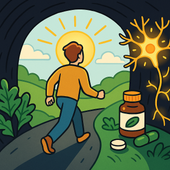
Post-Traumatic Growth and Supplements That Support It
After trauma, true healing means more than survival — it’s transformation. Learn how post-traumatic growth happens in the brain and body, and explore natural supplements like magnesium, ashwagandha, saffron, and omega-3s that support resilience, clarity, and emotional repair.
-
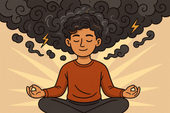
How to Regain Focus After Emotional Stress
After emotional stress, your nervous system feels frayed — your focus fades, thoughts race, and calm seems impossible. Learn how to restore balance, rebuild concentration, and retrain your brain for clarity and peace through evidence-based mind–body tools. 🌿
-
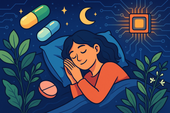
The Future of Sleep Supplements
The future of sleep supplements is here — where science meets nature. Discover how next-generation formulas use adaptogens, amino acids, and biotech innovations to support deep, restorative sleep without dependency. 🌙
-
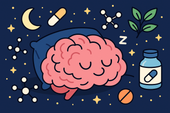
Emerging Research on Sleep and Nootropics
Can nootropics help you sleep better? Discover how compounds like L-theanine, magnesium threonate, ashwagandha, and Alpha-GPC influence neurotransmitters, circadian rhythm, and brain recovery — bridging the gap between smarter days and deeper nights. 🌙
-
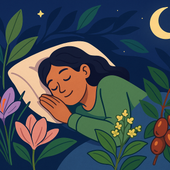
New Herbal Extracts for Deep Sleep
Discover the next generation of herbal extracts for deep sleep — from saffron and magnolia to jujube and lemon balm. Learn how these plant-based compounds calm the nervous system, balance cortisol, and promote truly restorative rest. 🌙
-
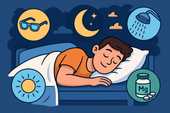
Sleep Biohacking: What Works and What Doesn’t
Biohacking your sleep can sound futuristic — from red light therapy to wearables and supplement stacks. But which hacks actually help, and which are just hype? Discover the science-backed sleep strategies that truly improve rest, recovery, and brain health. 🌙
-
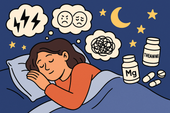
Sleep Support for People with Anxiety Disorders
💭 A restless mind can keep you up all night — thoughts spinning, heart racing, and peace feeling far away. Learn how to quiet overthinking, regulate your nervous system, and create a nightly ritual that teaches your brain to let go and rest deeply. 🌙
-
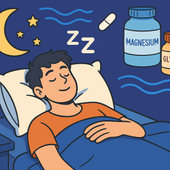
How to Fall Back Asleep After Waking Up
Waking up in the middle of the night? Learn how to fall back asleep quickly and calmly using breathing techniques, stress-reducing rituals, and natural supplements like magnesium and glycine. Restore your body’s rhythm and wake up feeling refreshed.
-
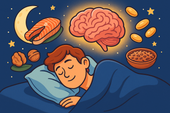
The Role of Omega-3s in Sleep Quality
-
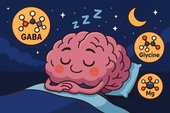
Stacking GABA and Glycine for Deeper Rest
Discover how stacking GABA and glycine can help you achieve deeper, more restorative sleep. Learn how these calming amino acids work together to relax your mind, soothe your body, and improve overall sleep quality—naturally and safely.
-
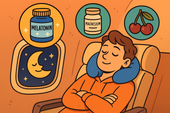
Overcoming Jet Lag with Supplements
✈️ Jet lag doesn’t have to ruin your trip! Discover how supplements like melatonin, magnesium, L-theanine, and tart cherry can help you reset your body clock faster, reduce fatigue, and recover energy naturally after long flights. 🌙
-
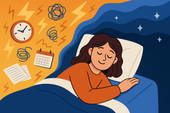
Managing Sleep During Times of Stress
Feeling wired and restless? Learn how to manage sleep during stressful times through nutrition, breathwork, and natural supplements like magnesium and L-theanine. Discover how to calm your nervous system and restore deep, peaceful rest—even when life feels overwhelming.
-
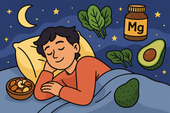
The Role of Magnesium for Night Cramps
Night cramps keeping you awake? Discover how magnesium helps relax muscles, balance electrolytes, and prevent painful spasms. Learn which forms work best, how to take them, and how to pair them with other nutrients for cramp-free, peaceful sleep.
-
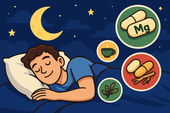
Supplements That Reduce Nighttime Awakenings
🌙 Discover science-backed supplements that help you stay asleep through the night. From magnesium and L-theanine to glycine and ashwagandha, learn how these natural compounds calm your nervous system, balance cortisol, and prevent 2 a.m. wake-ups for deeper, more restorative rest.
-

Nootropics That Promote Calm and Rest
Explore the world of calming nootropics — natural brain enhancers that promote relaxation, better focus, and deeper rest. Learn how L-Theanine, magnesium, ashwagandha, and other adaptogens help balance your nervous system, reduce stress, and support restorative sleep.
-

Best Natural Supplement Stack for Sleep
Discover the best natural supplement stack for deep, restorative sleep. Learn how nutrients like magnesium, L-theanine, glycine, and calming herbs such as chamomile and ashwagandha work together to relax your body, calm your mind, and improve sleep quality—naturally and safely.
-

Combining L-Theanine and Magnesium for Sleep: A Calm Night, Naturally
Discover how combining L-Theanine and Magnesium can help you drift into deep, restorative sleep. Learn how this natural duo calms the mind, relaxes the body, and supports your nervous system—without grogginess the next morning.
-

How to Sleep Better After Intense Workouts
Struggling to fall asleep after a tough workout? Learn how to optimize your post-training recovery with nutrition, hydration, and science-backed sleep strategies. Discover how to calm your nervous system, balance hormones, and wake up fully recharged for your next session.
-

Ashwagandha and Valerian: A Bedtime Combo for Deep Rest and Emotional Reset
Discover the calming synergy of Ashwagandha and Valerian root, two natural sleep aids that help quiet the mind, ease anxiety, and promote deeper rest. Learn how this herbal duo supports the nervous system, balances stress hormones, and restores emotional peace — without next-day grogginess.
-

How to Create a Resilience-Boosting Diet
Discover how to build emotional and physical strength from the inside out with a resilience-boosting diet 🍎. Learn which foods stabilize your mood, how supplements like magnesium and omega-3s strengthen your stress response, and why pairing nutrition with breathwork and therapy creates lasting calm, focus, and vitality 🌿💪.
-

Best Teas and Herbal Blends for Calmness: Nature’s Way to Restore Inner Peace
Ashwagandha, the ancient adaptogenic herb, helps your body find balance during stress. Known as “Indian ginseng,” it supports cortisol regulation, boosts energy, and restores calm clarity. Discover how this powerful root promotes resilience, emotional balance, and steady vitality — one cup at a time. 🌸
-

Parenting and Emotional Strength: How to Raise Children Without Losing Yourself
Empathy is the bridge that connects hearts — the quiet power to understand, feel, and support another’s emotions without judgment. Learn how empathy strengthens relationships, enhances communication, and cultivates deeper compassion in everyday life. 🌿
-

How to Bounce Back from Public Failure: Reclaiming Confidence, Purpose, and Power
Visualization is more than imagination — it’s brain training for resilience. By picturing calm, success, or healing, you activate the same neural pathways as real experience. Learn how daily visualization rewires your brain for confidence, emotional balance, and recovery from stress. ✨
-

Coping with Financial Stress Through Resilience: How to Stay Grounded When Money Feels Tight
Body awareness is the foundation of emotional resilience. By tuning into your body’s signals — tension, fatigue, or calm — you learn to recognize stress before it overwhelms you. Discover how mindfulness, gentle movement, and breathwork can deepen your connection with your body and restore balance from the inside out. 🧘
-

How to Stay Positive During Chronic Illness: A Guide to Emotional Strength and Hope
Creativity is more than art — it’s a form of healing. Whether through painting, writing, music, or small acts of expression, creativity helps release emotion, calm the nervous system, and reconnect you to joy. Discover how to use creativity as a tool for emotional balance, resilience, and self-discovery. 🌿
-

Resilience Tips for Caregivers: How to Stay Strong While Caring for Others
Joy isn’t the absence of pain — it’s the quiet strength to find light even in challenging times. Cultivating joy through small daily moments restores balance, releases stress, and reminds you of life’s beauty. Learn how to reconnect with authentic happiness, rebuild emotional energy, and nurture your nervous system through gratitude, presence, and play. 🌿
-

Building Resilience After a Breakup: How to Heal, Rebuild, and Rise Stronger
Social connection is one of the strongest predictors of emotional resilience. During difficult times, genuine relationships act as anchors — calming the nervous system, reducing stress hormones, and helping you regain perspective. Learn how cultivating real human connection can strengthen your mind, heart, and overall well-being. 🌿
-

How to Stay Emotionally Strong During Job Loss
Your emotions are powered by brain chemistry — a delicate balance of neurotransmitters like serotonin, dopamine, and cortisol. When these chemicals work in harmony, you feel calm, focused, and resilient. Learn how daily habits, nutrition, and mindfulness can support your brain chemistry and boost emotional well-being naturally. 🌿
-

The Role of Hormones in Emotional Stability: How Your Chemistry Shapes Your Calm
Hormones shape more than your body — they shape your emotions, resilience, and sense of calm. From cortisol to serotonin, these chemical messengers influence how you react to stress, connect with others, and recover from challenges. Learn how to balance your hormones naturally to build lasting emotional stability and harmony within. 💫
-

Mitochondria and Emotional Energy: The Cellular Power Behind Your Mood
Breathwork is one of the most powerful tools for emotional regulation and cellular balance. Through intentional breathing, you can calm your nervous system, increase oxygen flow to the brain, and even support mitochondrial energy. Learn how conscious breathing connects body and mind — transforming stress into presence and emotional strength. 🌿
-

Inflammation and Its Impact on Mood Resilience: The Silent Link Between Body and Mind
Inflammation doesn’t just affect the body — it impacts the mind. Chronic inflammation alters brain chemistry, depletes serotonin, and makes emotional recovery harder. Learn how calming inflammation through nutrition, mindfulness, and sleep can restore balance, resilience, and a renewed sense of emotional strength. 💫
-

How Antioxidants Protect Emotional Well-being: The Hidden Link Between Oxidative Stress and Mental Health
Antioxidants do more than protect your body — they defend your mind. By neutralizing oxidative stress, antioxidants support serotonin, dopamine, and brain energy pathways that keep you calm, focused, and emotionally balanced. Discover how foods like berries, green tea, and dark chocolate nourish your brain, boost mood, and strengthen resilience from the inside out. 🌿✨
-

The HPA Axis and Emotional Health: The Hidden Bridge Between Stress and Mind
Neuroplasticity — the brain’s ability to rewire and adapt — is the foundation of emotional healing and resilience. When you face stress, trauma, or change, your neural pathways can reshape themselves to support new patterns of calm, focus, and self-awareness. Learn how daily practices like mindfulness, therapy, and breathwork strengthen neuroplasticity to transform emotional pain into personal growth. 🌸
-

Why Cortisol Control Is Key to Resilience: Mastering Stress to Build Emotional Strength
Controlling cortisol — the body’s main stress hormone — is the secret to lasting resilience. When cortisol levels stay balanced, your mind becomes clearer, emotions steadier, and energy more sustainable. Learn how breathwork, mindset shifts, adaptogens, and daily rhythms can help you calm your stress response and build true inner strength. 🌞💪
-

Dopamine’s Influence on Motivation and Recovery: Reigniting Drive and Balance
Healthy relationships are the foundation of emotional balance and resilience. Whether romantic, familial, or platonic, genuine connection releases dopamine, serotonin, and oxytocin — the brain’s “bonding trio” — helping us feel secure, motivated, and seen. Learn how trust, empathy, and communication not only strengthen your connections but also reshape your nervous system for deeper emotional well-being. 🌿🤝
-

The Role of Serotonin in Resilience: How This “Mood Molecule” Shapes Emotional Strength
Serotonin — often called the “resilience molecule” — plays a vital role in how we handle stress, regulate mood, and recover from emotional challenges. Beyond happiness, this powerful neurotransmitter helps balance the gut-brain axis, stabilize the nervous system, and support emotional flexibility. Learn how nutrition, sunlight, mindfulness, and adaptogens can naturally boost serotonin and strengthen your emotional resilience. 🌞🧠
-

How Neuroplasticity Supports Emotional Growth: Rewiring the Brain for Resilience
Neuroplasticity is the brain’s built-in power to grow, adapt, and heal — and it’s the foundation of emotional transformation. Every mindful breath, compassionate act, or reframed thought strengthens new neural pathways that support resilience and self-awareness. Learn how your brain rewires through daily habits, helping you turn emotional challenges into opportunities for growth and calm. 🌿
-

Tai Chi and Adaptogens for Mind-Body Balance: The Art of Harmonizing Energy and Resilience
Alchemy isn’t just an ancient science — it’s a timeless symbol of transformation and inner balance. By blending the physical and spiritual, alchemy teaches us that change begins from within. Just as metals are refined into gold, we too can transmute emotional pain, stress, and chaos into clarity and strength through mindful practice and self-awareness. 🌙✨
-

Cold Therapy and Emotional Control: Training the Mind Through the Body
Cold therapy isn’t just for athletes — it’s a tool for emotional mastery. By exposing your body to controlled cold, you train your nervous system to stay calm under stress, improving focus, mood, and resilience. This article explores the science of cold exposure, its impact on hormones and the vagus nerve, and how ice baths and cold showers can help you build emotional control, one breath at a time. 🧊🧘♂️
-

How Music Influences Emotional Recovery: The Healing Soundtrack of the Mind
Neuroplasticity — the brain’s ability to rewire and heal itself — is at the heart of emotional recovery. Through mindful habits, music, therapy, and consistent mental stimulation, your brain can form new connections that support resilience and well-being. Discover how neuroplasticity turns pain into growth, helping you rebuild balance, focus, and emotional strength. 🌿
-

Nature Therapy for Building Resilience: Reconnecting With the Healing Power of the Earth
Nature therapy helps rebuild emotional resilience by reconnecting you with the healing rhythms of the Earth. From forest walks to sunlight exposure, nature restores balance to your nervous system, lowers stress hormones, and teaches emotional adaptability. Learn how spending time outdoors can enhance mental clarity, calm anxiety, and awaken your natural capacity to heal. 🌞
-

Breathwork Techniques That Pair with Supplements: The Ultimate Synergy for Stress Relief and Mental Clarity
Breathwork and supplements create a powerful mind-body synergy for stress relief, focus, and energy. By combining intentional breathing with adaptogens, nootropics, and calming nutrients, you can naturally regulate cortisol, sharpen mental clarity, and boost emotional balance. This guide explores the best breathwork techniques and supplement pairings to help you feel centered, calm, and energized from the inside out. 🌿


















































